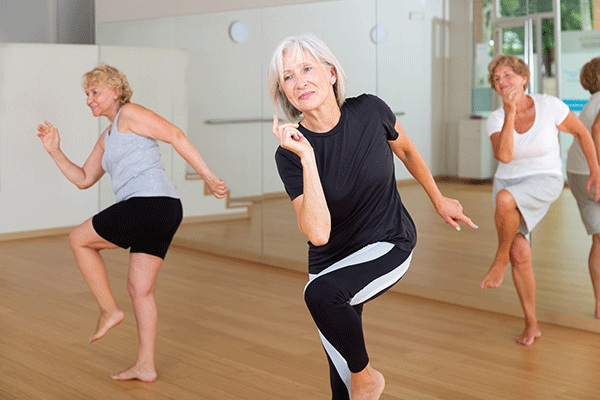A structured dance program may be better than other physical activities in improving well-being and cognitive capacity.
A structured dance program of at least six weeks’ duration can significantly improve psychological and cognitive health outcomes equivalent to other forms of structured exercise interventions, finds new research from Australian researchers.
Published in Sports Medicine, the study is a large systematic review with meta-analyses investigating the effect of dance on psychological and cognitive health. The multidisciplinary authorship team includes researchers from University of Sydney, University of NSW, Macquarie University and Queensland University of Technology.
The studies in the review included participants across the lifespan (7-85 years) encompassing people who are healthy and those with chronic disease i.e. Parkinson’s disease, heart failure, cerebral palsy, fibromyalgia. The dance interventions encompassed a broad range of genres including theatrical dance, aerobic dance, traditional dance forms and social dance, and were compared to a number of physical activities including team sport, martial arts, walking, and weight training.
The study found that undertaking structured dance of any genre is generally equal and occasionally more effective than other types of physical activity interventions for improving a range of psychological and cognitive outcomes including emotional well-being, depression, motivation, social cognition, and some aspects of memory.
Lead author Dr Alycia Fong Yan from University of Sydney’s Faculty of Medicine and Health and Sydney Musculoskeletal Health said: “Preliminary evidence suggests that dance may be better than other physical activities to improve psychological wellbeing and cognitive capacity.
“These findings were not just seen in older adults, but also younger populations and people with clinical conditions as well.
“Learning dance sequences may challenge cognition, partnered or group dance may benefit social interactions, and the artistic aspect may improve psychological wellbeing.
“Adherence to physical activity is an ongoing challenge in clinical trials and even more so in community. Dance can provide an enjoyable physical activity that is easier to maintain.
“Most people know that physical activity is beneficial for health compared to doing nothing, but they may not realise that dance can be an effective alternative to standard exercise like running, going to the gym, and other sports.”
This research forms the second part to Dr Fong Yan’s well-cited systematic review exploring the effect of dance on physical health outcome measures.
In contrast to the predominant social dance genres assessed for older adults, six of the seven studies of participants under 55 years, examined the effects of dance genres that could be performed individually in a group setting such as aerobic dance and modern dance, suggesting dancing in itself improves psychological health not just the social benefits of partnered dance genres.
The study also found that in those 54 years and under, the current literature pool focuses on psychological outcomes, while for those 55 years and over, there is a greater focus on cognitive capacity. The effectiveness of dance interventions is most evident in the domains of self-efficacy, anxiety, depression, motivation, and health related quality of life, particularly in older individuals. While there is considerably less evidence in those 16 years of age and below, dance appears to be superior to other exercise in lessening the impact of somatization (the expression of psychological distress as physical symptoms).
Dr Fong Yan added: “Dance has far-reaching health benefits. If you stick to a physical activity, the long-term, physical health benefits will reduce the risk of health conditions related to sedentary behaviour, the social connectedness and psychological effect of dance will alleviate the symptoms of mental health conditions, and improvements in cognition could aid the independence of older adults.
“Ultimately, this reduces the burden of these conditions on the health sector.
“Structured dance can be considered an evidence-based alternative for individuals who might prefer it to more traditional forms of exercise.”
Paper: The effectiveness of dance interventions on psychological and cognitive health outcomes compared to other forms of physical activity across the lifespan: a systematic review with meta-analysis




